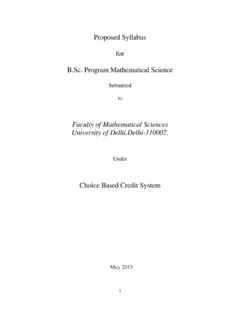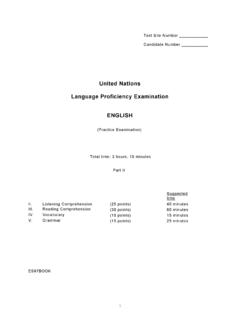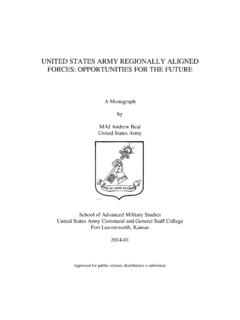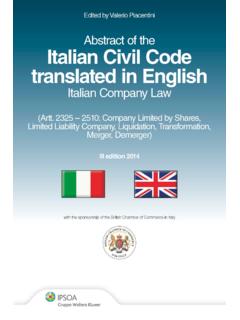Transcription of UNIVERSITY OF DELHI
1 Choice Based Credit System (CBCS). UNIVERSITY OF DELHI . DEPARTMENT OF POLITICAL SCIENCE. UNDERGRADUATE PROGRAMME. (Courses effective from Academic Year 2015-16). SYLLABUS OF COURSES TO BE OFFERED. Core Courses, Elective Courses & Ability Enhancement Courses Disclaimer: The CBCS syllabus is uploaded as given by the Faculty concerned to the Academic Council. The same has been approved as it is by the Academic Council on and Executive Council on Any query may kindly be addressed to the concerned Faculty. Undergraduate Programme Secretariat Preamble The UNIVERSITY Grants Commission (UGC) has initiated several measures to bring equity, efficiency and excellence in the Higher Education System of country. The important measures taken to enhance academic standards and quality in higher education include innovation and improvements in curriculum, teaching-learning process, examination and evaluation systems, besides governance and other matters.
2 The UGC has formulated various regulations and guidelines from time to time to improve the higher education system and maintain minimum standards and quality across the Higher Educational Institutions (HEIs) in India. The academic reforms recommended by the UGC in the recent past have led to overall improvement in the higher education system. However, due to lot of diversity in the system of higher education, there are multiple approaches followed by universities towards examination, evaluation and grading system. While the HEIs must have the flexibility and freedom in designing the examination and evaluation methods that best fits the curriculum, syllabi and teaching learning methods, there is a need to devise a sensible system for awarding the grades based on the performance of students. Presently the performance of the students is reported using the conventional system of marks secured in the examinations or grades or both.
3 The conversion from marks to letter grades and the letter grades used vary widely across the HEIs in the country. This creates difficulty for the academia and the employers to understand and infer the performance of the students graduating from different universities and colleges based on grades. The grading system is considered to be better than the conventional marks system and hence it has been followed in the top institutions in India and abroad. So it is desirable to introduce uniform grading system. This will facilitate student mobility across institutions within and across countries and also enable potential employers to assess the performance of students. To bring in the desired uniformity, in grading system and method for computing the cumulative grade point average (CGPA) based on the performance of students in the examinations, the UGC has formulated these guidelines.
4 CHOICE BASED CREDIT SYSTEM (CBCS): The CBCS provides an opportunity for the students to choose courses from the prescribed courses comprising core, elective/minor or skill based courses. The courses can be evaluated following the grading system, which is considered to be better than the conventional marks system. Therefore, it is necessary to introduce uniform grading system in the entire higher education in India. This will benefit the students to move across institutions within India to begin with and across countries. The uniform grading system will also enable potential employers in assessing the performance of the candidates. In order to bring uniformity in evaluation system and computation of the Cumulative Grade Point Average (CGPA) based on student's performance in examinations, the UGC has formulated the guidelines to be followed.
5 Outline of Choice Based Credit System: 1. Core Course: A course, which should compulsorily be studied by a candidate as a core requirement is termed as a Core course. 2. Elective Course: Generally a course which can be chosen from a pool of courses and which may be very specific or specialized or advanced or supportive to the discipline/ subject of study or which provides an extended scope or which enables an exposure to some other discipline/subject/domain or nurtures the candidate's proficiency/skill is called an Elective Course. Discipline Specific Elective (DSE) Course: Elective courses may be offered by the main discipline/subject of study is referred to as Discipline Specific Elective. The UNIVERSITY /Institute may also offer discipline related Elective courses of interdisciplinary nature (to be offered by main discipline/subject of study).
6 Dissertation/Project: An elective course designed to acquire special/advanced knowledge, such as supplement study/support study to a project work, and a candidate studies such a course on his own with an advisory support by a teacher/faculty member is called dissertation/project. Generic Elective (GE) Course: An elective course chosen generally from an unrelated discipline/subject, with an intention to seek exposure is called a Generic Elective. : A core course offered in a discipline/subject may be treated as an elective by other discipline/subject and vice versa and such electives may also be referred to as Generic Elective. 3. Ability Enhancement Courses (AEC)/Competency Improvement Courses/Skill Development Courses/Foundation Course: The Ability Enhancement (AE) Courses may be of two kinds: AE. Compulsory Course (AECC) and AE Elective Course (AEEC).
7 AECC courses are the courses based upon the content that leads to Knowledge enhancement. They ((i) Environmental Science, (ii). English/MIL Communication) are mandatory for all disciplines. AEEC courses are value-based and/or skill-based and are aimed at providing hands-on-training, competencies, skills, etc. AE Compulsory Course (AECC): Environmental Science, English Communication/MIL. Communication. AE Elective Course (AEEC): These courses may be chosen from a pool of courses designed to provide value-based and/or skill-based instruction. Project work/Dissertation is considered as a special course involving application of knowledge in solving / analyzing /exploring a real life situation / difficult problem. A Project/Dissertation work would be of 6 credits. A Project/Dissertation work may be given in lieu of a discipline specific elective paper.
8 Details of courses under (Honors), (Honors) & (Honors). Course *Credits Theory+ Practical Theory + Tutorial ======================================== =========================. I. Core Course (14 Papers) 14X4= 56 14X5=70. Core Course Practical / Tutorial*. (14 Papers) 14X2=28 14X1=14. II. Elective Course (8 Papers). Discipline Specific Elective 4X4=16 4X5=20. (4 Papers). Discipline Specific Elective Practical/ Tutorial* 4 X 2=8 4X1=4. (4 Papers). Generic Elective/. Interdisciplinary 4X4=16 4X5=20. (4 Papers). Generic Elective Practical/ Tutorial* 4 X 2=8 4X1=4. (4 Papers). Optional Dissertation or project work in place of one Discipline Specific Elective paper (6. credits) in 6th Semester III. Ability Enhancement Courses 1. Ability Enhancement Compulsory (2 Papers of 2 credit each) 2 X 2=4 2 X 2=4. Environmental Science English/MIL Communication 2.
9 Ability Enhancement Elective (Skill Based). (Minimum 2) 2 X 2=4 2 X 2=4. (2 Papers of 2 credit each). _____ _____. Total credit 140 140. Institute should evolve a system/policy about ECA/ General Interest/Hobby/Sports/NCC/NSS/related courses on its own. * wherever there is a practical there will be no tutorial and vice-versa CHOICE BASED CREDIT SYSTEM. LIST OF PAPERS AND COURSES. (HONOURS) POLITICAL SCIENCE. A) CORE COURSE (14). Paper I- Understanding Political Theory Paper II- Constitutional Government and Democracy in India Paper III Political Theory-Concepts and Debates Paper IV- Political Process in India Paper V- Introduction to Comparative Government and Politics Paper VI Perspectives on Public Administration Paper VII- Perspectives on International Relations and World History Paper VIII- Political Processes and Institutions in Comparative Perspective Paper IX- Public Policy and Administration in India Paper X- Global Politics Paper XI- Classical Political Philosophy Paper XII- Indian Political Thought-I.
10 Paper XIII- Modern Political Philosophy Paper XIV- Indian Political Thought-II. B) Generic Elective -4 (Interdisciplinary): Any Four 1. Nationalism in India 2. Contemporary Political Economy 3. Feminism: Theory and Practice (This paper has been swapped by the paper titled Women, Power and Politics'). 4. Gandhi and the Contemporary World 5. Understanding Ambedkar 6. Governance: Issues and Challenges 4. 7. Politics of Globalization 8. united nations and Global Conflicts C) Discipline Specific Elective-4 (DSE): Any Four 1. Citizenship in a Globalizing World 2. Human Rights in a Comparative Perspective 3. Development Process and Social Movements in Contemporary India 4. Public Policy in India 5. Understanding Global Politics (This paper has been replaced by the paper titled Colonialism and Nationalism in India').














